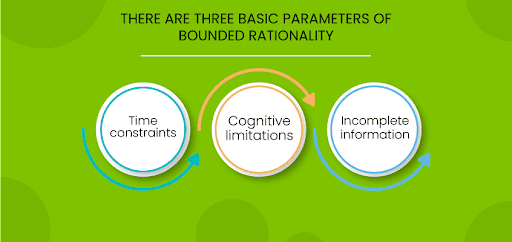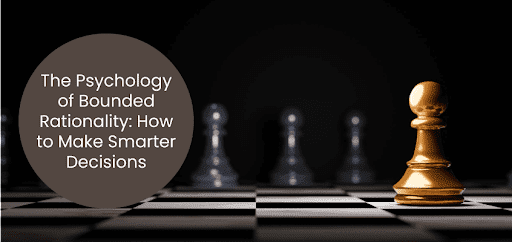Introduction
Human beings are irrational, making decisions based on cognitive bias and emotions. Instead of making perfect choices, they often make choices that they consider are good from their limited perspective. So, can humans be trusted, especially during crises? Here, we will be discussing decision-making and the psychology of bounded rationality in making more intelligent decisions.
Our Wellness Programs
What is bounded rationality?
Bounded rationality is a decision-making process where we try to satisfy our objectives as per pre-determined opinions instead of aiming for the best outcome.
The psychology of bounded rationality plays a vital role in making decisions within accessible knowledge and potential cognitive limitations.
There are three basic parameters of bounded rationality.

- Time constraints
- Cognitive limitations
- Incomplete information
Economics has many areas where bounded rationality comes to play. Individuals who supposedly make sound financial decisions may not be as talented as everyone thinks. In reality, they might be satisficers or individuals who simply consider the closest and easiest option to meet their objectives and requirements. These individuals do not always go to great lengths to ensure they have considered all possibilities.
Looking for services related to this subject? Get in touch with these experts today!!
Experts

Banani Das Dhar

India
Wellness Expert
Experience: 7 years

Devika Gupta

India
Wellness Expert
Experience: 4 years

Trupti Rakesh valotia

India
Wellness Expert
Experience: 3 years

Sarvjeet Kumar Yadav

India
Wellness Expert
Experience: 15 years
An example of bounded rationality
This example about bounded rationality illustrates its role in decision-making.
Mr Foley needs to attend his sister’s wedding. But on the day of the wedding, he realises that the shoes he is about to wear for the big day have holes. So, he rushes to the store to get a new pair. He does not have time as the ceremony starts in five minutes.
Under normal circumstances, Mr Foley would visit a couple of stores to buy the best pair of shoes as per his liking. However, due to time constraints, he is satisfied with this situation. Since he needs any pair of shoes, he prioritises that above his budget, style and other preferences. As a result, Mr Foley ends up paying twice his budget for a pair of shoes, which he would not do otherwise if the urgency weren’t there.
Another example of decision-making in bounded rationality
Let us look at another example of decision-making in bounded rationality.
Mr Antle is the Chief Executive Officer (C.E.O.) of one of the leading multinational companies with branches in Asia, Europe, South and North America. His company’s profits and revenues are decreasing, much to the shareholders’ dissatisfaction.
Hence, it becomes crucial for Mr Antle to make the right decision. But the whole situation is like looking for a needle in a haystack. He is loaded with information that needs correct organisation and compilation to make a good decision. It is almost impossible for any C.E.O. to make the right decision under such circumstances. Mr Antle first needs to organise helpful information, but he might be completely unaware of the other practical details hidden from his view.
Information from a worker on the factory floor might be valuable in improving operations, but only if Mr Antle can find it and learn how to use it. There are high chances of Mr Antle being unable to gather all the vital information. It results in Mr Antle making a decision that meets a restricted and limited set of criteria which may or may not be the right decision for the entire company.
Why is bounded rationality critical?
- Bounded rationality is essential to businesses that use it to their benefit. Companies use individuals’ flawed or bounded rationality decision-making as a marketing strategy.
- Most businesses label their goods with attractive adjectives and qualifiers without significance. Hence, consumers who want to understand the hidden agenda of a company’s marketing strategy must know how companies use customers’ decision-making based on bounded rationality to their benefit.
- Companies know that customers do not have much time to go through the fine print or examine all information on the products they want to purchase.
- Bounded rationality causes human beings to go for good choices instead of the best ones.
How does the Psychology of bounded rationality help in making smarter decisions
The psychology of bounded rationality in making smarter decisions revolves around the concept that customers will make optimised economic decisions in line with their temporary self-interest.
We live in an uncertain and complex world where humans make decisions under time, resource and knowledge constraints. Yet, rational decision-making models in biology, cognitive science, economics and other fields ignore these restrictions and assume people have unlimited time and perfect information to make decisions.
American political scientist, Herbert Simon, challenged this view with his idea of bounded rationality, which states that neoclassical economics takes the back seat because of the effect of bounded rationality. Satisficers are not adept at making consistent decisions. They always decide based on morality, social standards, affection, justice and peer influences, subject to many forces, including our prejudices. They might even make decisions in the heat of the moment without thinking about repercussions.
Conclusion
To conclude, bounded rationality refers to a vast selection of normative, prescriptive and descriptive accounts of highly effective behaviour that depart from the assumptions of ideal rationality.
The article highlights contributions from economics, decision sciences, neuropsychology, cognitive psychology, computer science, biology and philosophy to illustrate bounded rationality.
The psychology of bounded rationality in the decision-making process of humans shows how even sound financial judgements can be different from economic rationality. Instead of making the most optimal decisions, people tend to make decisions that satisfy their limited perspective and knowledge.
If you want to reduce the effects of bounded rationality decision-making and make optimal decisions instead of satisfactory ones, or at least be aware of the impact, United We Care is here to talk to you. It is possible to make life-affirming changes to your old patterns through therapy and counselling with our experts at United We Care. Call us today for a quick session.

















